5 generals defeated by General Vo Nguyen Giap
(Baonghean.vn) - During the long march to regain independence of the Vietnamese people in the 20th century, French colonialism and American imperialism with the most modern and powerful army in the world had to fall at the feet of peasant soldiers "wearing tire sandals" commanded by General, Commander-in-Chief Vo Nguyen Giap.
1. General Philippe Leclerc
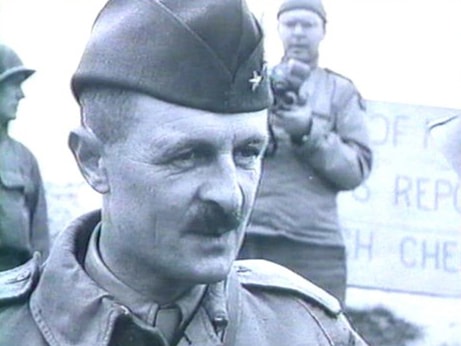 |
| The first French general to be defeated by General Vo Nguyen Giap. |
Four-star general Philippe leclerc was the first to fail. General Philippe leclerc took office in Vietnam in August 1945, and was recalled in June 1946 because of the failure of the "fight fast, win fast" strategy.
During this period, hiding behind the British army, the French army provoked aggression in the South and then sent troops to Hai Phong and Lang Son, breaking the agreements and temporary treaties signed with our Government, determined to capture the headquarters of the young State government. However, that plan quickly went bankrupt because our armed forces held them back and prevented them from quickly carrying out their plan.
2. General Henri Navarre
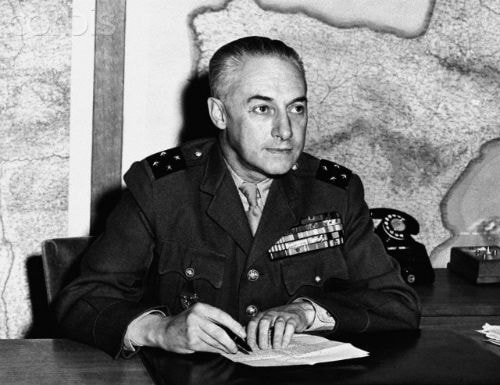 |
| Foreign press once praised Navarre as a famous general who could "rectify the situation in Indochina..." |
Henri Eugène Navarre (July 31, 1898 - September 26, 1983) was a French army general who fought in World War I, World War II and was the Commander-in-Chief of the French army at the Dien Bien Phu battlefield. On May 7, 1953, General Henri Navarre was appointed Commander-in-Chief of the French army in Indochina.
Overconfidence and underestimation of the Viet Minh's capabilities led to Navarre's failure. In 1956, Navarre retired and published the book "Indochina's Dying" blaming his failure in Indochina on the nature of the French political system, intellectuals, politicians, journalists and communist activists.
3. General De Castries
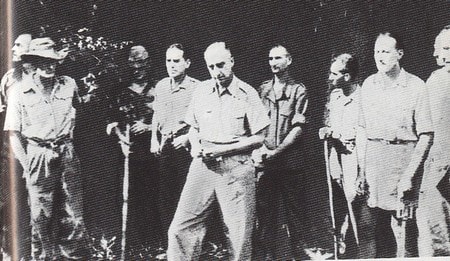 |
| On the afternoon of May 7, 1954, General de Castries (center) and the French General Command at the Dien Bien Phu battlefield surrendered, ending the French colonialists' dream of dominating Indochina. |
General De Castries (1902-1991) was the commander of the stronghold and the highest commander of the French army in the battle of Dien Bien Phu. The capture of General De Castries in his bunker on May 7, 1954 marked the defeat of the French army in the war.
Referring to the defeat at Dien Bien Phu, General De Castries expressed his admiration for General Vo Nguyen Giap's military talent. "General Giap was an intelligent, brave man, a good guerrilla commander. He was also good at politics and communism. We saw that clearly. Now through the Dien Bien Phu battle, I see that General Giap was not only good at commanding guerrilla warfare, but also good at commanding field battles, commanding joint operations, and even at deception to deceive enemy intelligence," General De Castries shared.
4. General William Westmoreland
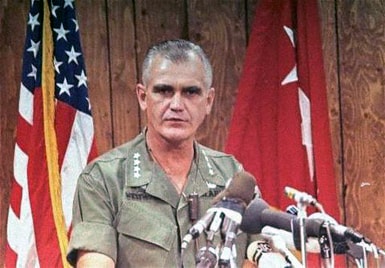 |
| General William Westmoreland - Commander in Chief of the US Army in the Vietnam War (1964 - 1968). |
William Westmoreland, born in 1914 and passed away in 2005, was a famous general in World War II as well as in the Korean War (1950 - 1953) before participating in the war in South Vietnam. Westmoreland began participating in the war in South Vietnam in July 1963. At that time, Westmoreland was a lieutenant general holding the position of Deputy Commander of the US Military Advisory Command, under the command of General Paul Harkins.
By August 1964, he replaced General Paul Harkins and became the highest-ranking commander of the US military in the Vietnam War. Until his death, the four-star general of the US military still did not believe that he had ever failed in the Vietnam War, where he commanded the largest force of soldiers during the Indochina War.
5. General McNamara
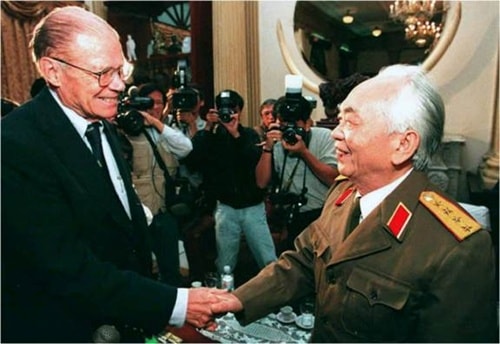 |
| Former US Secretary of DefenseRobert Strange McNamarashaking hands with General Giap during a meeting in 1995 in Hanoi. |
Robert Strange McNamara is considered the “chief architect” of the Vietnam War. He was born in 1916 in San Francisco, California and died in 2009 in Washington, USA. After his first visit to Vietnam in April 1962, McNamara said: “Every quantitative calculation we have shows that we are winning.” McNamara also claimed that victory in Vietnam could be achieved within 3 to 4 years.
In 1965, in addition to bringing tens of thousands of troops to South Vietnam, fighter planes carried out 55,000 sorties, dropping 33,000 tons of bombs on North Vietnam. The following year, the number of bombing raids increased to 148,000, with 128,000 tons of bombs. However, the results were not as expected by the US, in 1966, McNamara expressed his disappointment: "No amount of bombs can end the war" in Vietnam.
Peace
(Synthetic)
| RELATED NEWS |
|---|

